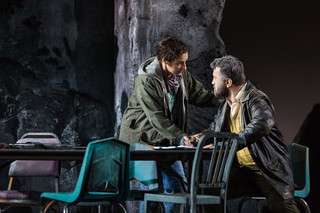|
Back
An exciting discovery Albany
Cooperstown (Alice Busch Theater)
07/16/2017 - & July 22, 24, August 4, 10, 12*, 15, 19, 2017
Gaetano Donizetti: L’assedio di Calais
Adrian Timpau (Eustachio de Saint-Pierre), Leah Crocetto (Eleanora), Aleks Romano (Aurelio), Chaz’men Williams-Ali (Giovanni d’Aire), Michael Hewitt (Edoardo III), Helena Brown (Isabella), Makoto Winkler (Pietro de Wisants), Zachary Owen (An English Spy), Carl DuPont (Armando), Joseph Leppek (Giacomo de Wisants), Andrés Moreno Garcia (Edmondo)
The Glimmerglass Festival Chorus, David Moody (chorus master), The Glimmerglass Festival Orchestra, Joseph Colaneri (conductor)
Francesca Zambello (director), James Noone (set designer), Jessica Jahn (costume designer), Mark McCullough (lighting designer)

A. Romano & A. Timpau (© Karli Cadel)
The Siege of Calais is an overlooked opera from Donizetti’s peak period and it turns out to be a vibrant work, here given a high-tension production by Francesca Zambello under the sure baton of Joseph Colaneri.
What distinguishes it from other Donizetti works (and almost every other work in the 19th century operatic canon) is the absence of a romance in the plot. No languishing maidens or lovelorn tenors here. What we have is a family drama: the mayor of the besieged city of Calais, Eustachio de Saint-Pierre and his wife, Eleanora, are deeply concerned about the fate of their plucky son, Aurelio, who has attempted to escape. He returns safely, but the siege continues with much turmoil and dissension. Eventually the English king arrives and demands the lives of six civic leaders in exchange for peace. Eustachio and Aurelio are among the six martyrs when the English queen, Isabella, persuades the king to relent. Thus a happy ending for a serious drama containing a notable amount of rousing martial music.
The opera contains a good deal of vigorous ensemble work and all three principals have voices that soar thrillingly through and over chorus and orchestra. Moldovan baritone Adrian Timpau is just entering the Metropolitan Opera’s Lindemann Young Artist Development Program and already seems fully capable of assuming major roles with a rich voice that sounded more bass-baritonal to me. Leah Crocetto almost overwhelms the role of Eleanora with voice that soars into spinto territory.
A real discovery is Aleks Romano (who also bills herself as Aleksandra Romano) whose ardent voice and presence seized one’s attention from the get-go.
There IS a tenor role in the work, that of Giovanni d’Aire, a cohort of Eustachio, ably performed by young artist Chaz’men Williams-Ali. The fifth lead role arrives late in the action: the English king, Edoardo III. Michael Hewitt, another member of the festival’s Young Artists Program, turns out to be one of the fine discoveries this year, with a sturdy voice and presence (he also plays Jud Fry in Oklahoma).
The queen (here named Isabella although the historical figure was Philippa) plays a crucial role when she convinces her husband to relent, but it is a brief role without an aria. (She is more like the deus ex machina figure that appears toward the end of a classical drama and bring about a denouement.) In this production we get the impression that the king submits so abruptly because he is tired of her scolding. Helena Brown displays the proper charisma - too bad we didn’t hear more from her.
(In one version of the opera her arrival is accompanied by a ballet. In a siege-bound city? It’s a good thing it was cut.)
Francesca Zambello and team have updated the action from 1346 (the first of several sieges this strategic city has undergone) to this century, with reference to the lengthy agony of the informal migrant camp that was demolished in 2016. A work of drama such as an opera could well be made of this incident, but in many ways Donizetti and Cammarano’s opera really doesn’t fit. In an attempt to make opera appear relevant the comparison made can seem facile, doing credit neither to the work nor the social issue. This gripping opera embodies its own truths in its own way.
Michael Johnson
|